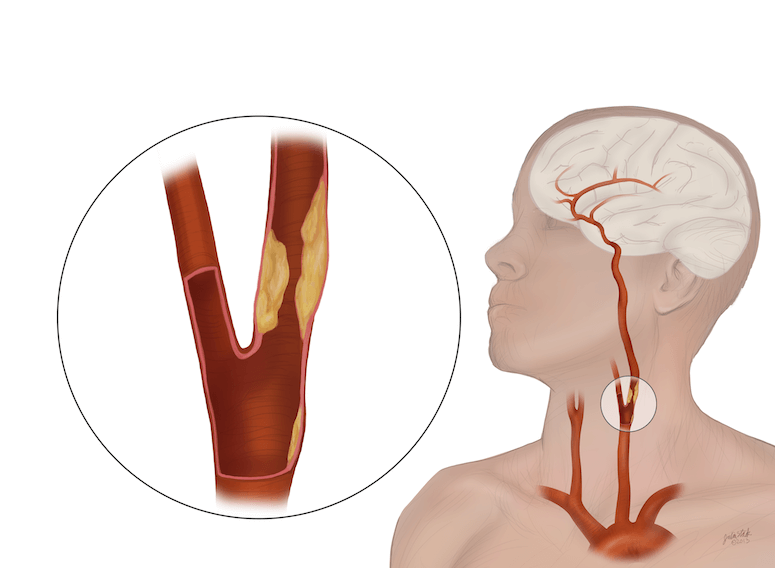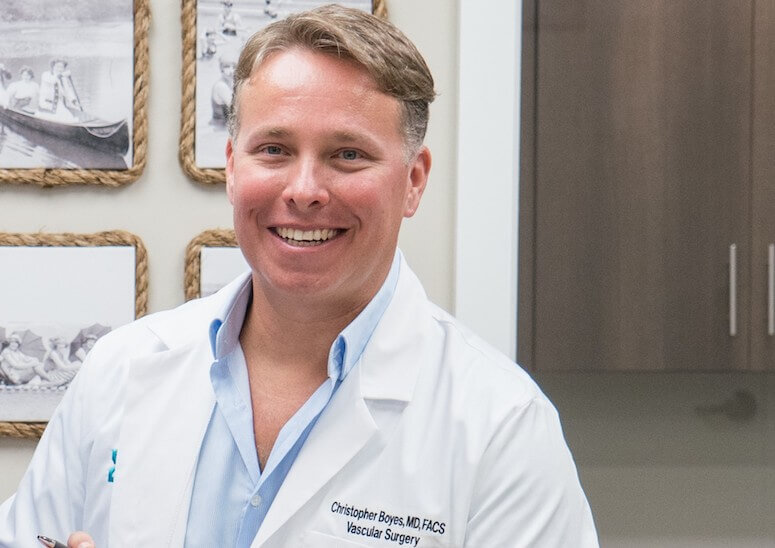There is encouraging news for those considered high risk for strokes from carotid artery disease. Trans Carotid Artery Revascularization (TCAR) is a groundbreaking surgical procedure that continues to impress with each successive study. TCAR offers a minimally invasive stroke prevention alternative.
The carotid arteries are the two main vessels that feed oxygen-rich blood to the brain. While other arteries also contribute, these vessels deliver the majority of cerebral blood flow. A buildup of plaque tissue within the artery can severely reduce the blood flow, as much as 95%, and create critical health risks. A stroke occurs when the brain is deprived of oxygen.

Carotid Endarterectomy (CEA) has been the leading treatment. However, CEA is major invasive surgery and has several drawbacks. It involves accessing the carotid artery via a long incision in the neck, creating a temporary arterial bypass, and surgically removing the plaque tissue. The invasive technique has substantial risk, discomfort, and recovery time. An alternative was needed, especially for patients placed at high risk with open surgery.
In 1996, Transfemoral Carotid Artery Stenting (TFCAS) was introduced as a less invasive technique. This procedure uses entry from the low-pressure femoral artery, located in the thigh, as a conduit to access the carotid artery in the neck. A metallic stent is positioned to open the blocked carotid artery. While there are benefits to this minimally invasive surgery, there are also complications related to the long access range and process, including higher rates of stroke during surgery than CEA.

As other options have continued to be explored, TCAR has emerged as the leading, minimally invasive procedure, more successful than its predecessors. This process combines advantages from other techniques while adding a major new component.
One of the biggest risks during this type of surgery is the dislodging of plaque or introduction of debris into the bloodstream that directly feeds the brain. This can lead to an embolism, perioperative stroke, or other complications.
Methods to minimize this risk have included bypassing the operative section, or mesh filtering the blood during the procedure. This has met with varying degrees of success. The TCAR process introduces a completely different approach – blood flow reversal.
Using a patented device, blood flow is reversed out of the targeted arterial section during surgery, so that any miniscule particles dislodged during the procedure do not enter the blood stream to the brain. The drawn blood is filtered and cycled back into the body via the femoral artery during surgery, maintaining safe blood pressure levels. Other arteries continue to feed the brain, providing enough oxygen for normal brain function.
TCAR accesses the carotid artery via a small incision just above the collar bone. A sheath is inserted into the artery through a small puncture. The sheath is used to readily access the diseased area, reverse blood flow, expand the arterial walls, and deliver a metallic stent.
The advantages over the CEA and TFCAS procedures are significant. This procedure is less invasive with a shorter surgical time and offers minimal patient discomfort and recovery time. Medical studies are showing better patient outcomes, which is leading to further implementation and expanded clinical study.
Surgery of this type is a serious medical procedure. Patients are typically of high risk for strokes and must meet certain criteria to be considered. The TCAR procedure is performed by select vascular surgeons.
Patients in the South Florida area are fortunate to have access to Dr. Christopher Boyes of Coastal Vein and Vascular Specialists. He is a board-certified vascular surgeon experienced with performing the Trans Carotid Artery Revascularization procedure. Please contact the office today if you are a candidate for this procedure or to consult on any of your other vascular concerns.

RESOURCES:
Annals of Vascular Surgery: Clinical Research, Volume 61, November 01, 2019; “Procedural Complexity of TransCarotid Artery Revascularization Is Not Increased in Irradiated and Reoperative Necks”; S. Keisin Wang, et. al.
Annals of Vascular Surgery: Clinical Research, Basic Science (Articles in Press), June 04, 2020; “A Systematic Review and Meta-Analysis of TransCarotid Artery Revascularization with Dynamic Flow Reversal versus Transfemoral Carotid Artery Stenting and Carotid Endarterectomy”; Isaac N. Naazie MD MPH, et. al.
Journal of Endovascular Therapy, April 2017; “Transcarotid Artery Revascularization with Flow Reversal”; Alper Alpaslan, et. al.
Journal of Vascular Surgery: Clinical Research Study Carotid Artery Disease, Volume 71, Issue 1, January 01, 2020; “In-hospital outcomes of transcarotid artery revascularization and carotid endarterectomy in the Society for Vascular Surgery Vascular Quality Initiative”; Marc L. Schermerhorn MD, et. al.
Cardiovascular Research Foundation, June 17, 2019; “TCAR Use Growing for Carotid Stenosis as Positive Data Continue to Accumulate”; Todd Neale

Subscribe to our newsletter
© Copyright 2023 Coastal Vein & Vascular | All Rights Reserved | Powered by Cord Media